Top Trends shaping the future of
Chinese E-commerce Market
By Anastasia Chapman
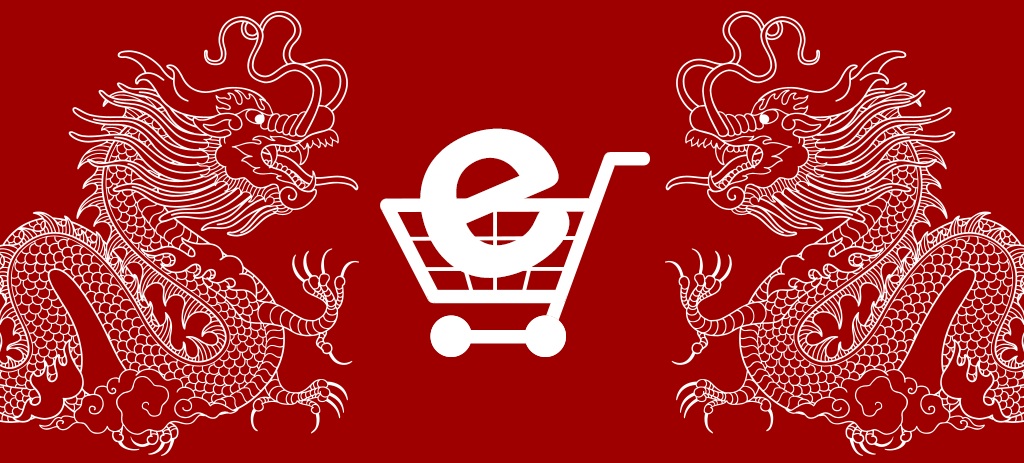 E-Commerce is in its heyday in China, representing approximately 40% of the world's e-commerce transactions, and it is further expected to reach half of the global market by 2020. Five years ago, Chinaãs e-commerce market was valued at $285 billion. Today, itãs an estimated $1.13 trillion, and in the near future, it's slated to rise up to $1.62 trillion surpassing that of the US by more than $100 billion.
E-Commerce is in its heyday in China, representing approximately 40% of the world's e-commerce transactions, and it is further expected to reach half of the global market by 2020. Five years ago, Chinaãs e-commerce market was valued at $285 billion. Today, itãs an estimated $1.13 trillion, and in the near future, it's slated to rise up to $1.62 trillion surpassing that of the US by more than $100 billion.
ÓçÍÙÍÍÀÌÙÈÍÊð¤ð¡ÙͧÓÕ¥ÓÌÑÌÐð¤Í¿ÇÍÿ¥ð¡ÙͧÓÓçÍÙÍÍÀͤ͡ð£ñÍ¥2850ð¤¢ÓƒÍ
Ðð£ÍÊˋÿ¥ÍÛð¥¯ÒÛÀð¡¤1.13ð¡ð¤¢ÓƒÍ
ÿ¥Í¿Ñð¡Í´ð¡ð¿
ÓͯÌËÿ¥ÕÂÒÛÀͯÒÑ
Ò¢1.62ð¡ð¤¢ÓƒÍ
Ð
The reason behind this sudden boom? E-commerce is significantly popular in China, as many Chinese consumers prefer shopping online rather than offline. Plus, Chinese consumers are extremely mobile-savvy. Even the older generations are comfortable with mobile commerce and purchasing online to offline services.
The rapid development of online retail along with an ever-expanding digital consumer base has boosted China's e-commerce market both domestically, and also globally through cross-border trade. This unique ecosystem in China is driving innovations in digital commerce, serving as a testbed for new ideas for the future global e-commerce marketplace. Letãs take a closer look at the top trends shaping the Chinese e-commerce landscape.
ÓçÍÙÍÍÀÍ´ð¡ÙͧÕÍ¡¡Í̘ÂÒ¢ÿ¥Í ð¡¤ÒÛ¡ÍÊð¡ÙͧÌÑÒÇ¿Ò
ÌÇÍ̘ÂÍ´Ó¤¢ÒÇÙÓˋÒð¡Ì₤Ó¤¢ð¡ÒÇÙÓˋÐÌÙÊÍÊÿ¥ð¡ÙͧÌÑÒÇ¿Ò
Í₤¿ÓϣʹÒÛƒÍÊÕÍ¡¡ÌÌÐÕÓ̯ÍÙÌÑÒÇ¿ÓƒÊð¡ÌÙÌˋÍÊÏÿ¥Ó§ð¡ÕÑÍÛð¡ÓÍ¢¨ÕÍÍÝÌ´Í´ð¤ð¡ÙͧÓÓçÍÙÍÍÀͤ͡ÿ¥ÒÛˋÌð£˜ð£Ó£ÓÓÍÀÕ ð¡ÙͧÓçÍÙÍÍÀÌ ¥ÍÝÓð¡£ÒÎÒÑÍ¢Ð
Leveraging China's Passion for Cross-border E-commerce
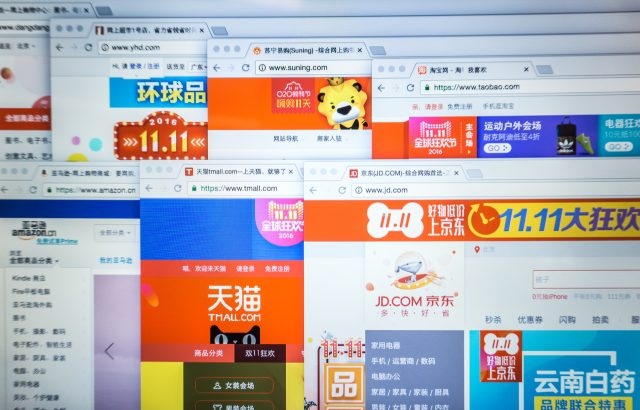 Online campaigns rolled out by China's e-commerce companies on China's Singles' Day.
Online campaigns rolled out by China's e-commerce companies on China's Singles' Day.
"No one can stop globalisation, no one can stop the trade," as part of an argument Jack Ma, the founder and executive chairman of Alibaba Group, claimed at the 2018 World Economic Forum Annual Meeting in Davos, explaining the role of e-commerce in driving globalisation in cross-border e-commerce between China and the rest of the world. The market size of China's cross-border e-commerce sales was $78.5 billion in 2016 and this number is expected to exceed $140 billion by 2021. So what is driving this trend? Firstly, the credit goes to a large number of Chinese citizens that move abroad for higher studies or work, gaining exposure to premium international products and brands more than ever. When they get back home, their only way of purchasing these products is via the cross-border e-commerce platforms, because domestically such products may not be available or are available at an inflated price at the local flagship retail outlets within China. Secondly, more and more Chinese consumers are turning to cross-border e-commerce platforms as a way to tackle concerns related to consumer and food safety. They have developed a deep trust towards international brands, especially when it comes to purchasing baby products, health and nutrition, beauty and other organic food products.
To get trusted international products, Chinese consumers either use Chinese cross-border e-commerce platforms like JD's JD Worldwide or Alibaba's TMall Global, or they rely on unofficial overseas sellers, also known as Daigou agents based in foreign markets that purchase authentic merchandise from overseas market and then use local platforms like Taobao and WeChat to reach Chinese consumers. China has now entered in such an era where consumers are enthusiastically purchasing both domestically and overseas. On the domestic front, it's a highly innovative scene with established tech titans, as well as budding firms jostling for the number one position.
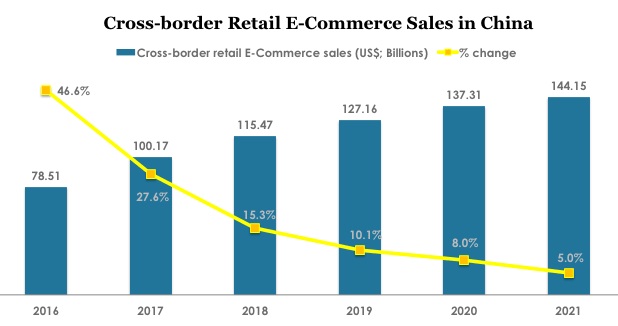 ð¡ÙͧÍ₤¿Òñ´ÍÂÓçÍÙÍÍÀÓÓÙÌ
ð¡ÙͧÍ₤¿Òñ´ÍÂÓçÍÙÍÍÀÓÓÙÌ
2016Í¿Çð¡ÙͧÒñ´ÍÂÓçÍÙÍÍÀÕÍÛÕÂð¡¤785ð¤¢ÓƒÍ
ÿ¥ÕÂÒÛÀͯ2021Í¿ÇÒ¢ð¡Ì¯ÍÙͯÒÑ
Ò¢1400ð¤¢ÓƒÍ
ÐÕÈð¿Ì₤ð£ð¿Ì´Í´ð¤Ò¢ð¡ÒÑÍ¢ÿ¥ÕÎÍ
ÿ¥ÍÊÏÕÓð¡ÙͧÍ
˜Ì¯Í₤ð£ËÒ§˜ÓϣͯͧÍÊÌËÍÕ¨ÓÙÌÒýÌÍñËð§ÿ¥Ì₤ð£Ë̓ð££ð§ÌÑÍÕ§ÌÇÌËÒ¢Õ¨Ó¨₤ͧÕ
ð¤ÏÍÍÍÓÐͧð£ð£˜ÍͧÍÿ¥ÒÇÙð¿¯Ò¢ð¤ð¤ÏÍÓÍ₤ð¡Ì¿Í¥Ì₤ÕÒ¢Òñ´ÍÂÓçÍÙÍÍÀÍ¿°Í¯ÐÍ
Ñ̘Àÿ¥ÒÑÌËÒÑÍÊÓð¡ÙͧÌÑÒÇ¿Ò
Ò§˜ÍÒñ´ÍÂÓçÍÙÍÍÀÍ¿°Í¯ÿ¥ð£ËÒÏÈÍ°ð¡ÌÑÒÇ¿Ò
ÍÕÈÍÍÛÍ
´Ó¡Í
°ÓÕÛÕÂÐð£ð£˜Í₤¿Í§Õ
ÍÓð¤ÏÓð¤ÌñÝÍ£Óð¢Àð££ÿ¥Ó¿Í¨Ì₤Í´ÒÇÙð¿¯ÍˋÇÍ¢Ó´Íÿ¥ÍËͤñÍÒËÍ
£Íÿ¥ÓƒÍÛ¿ÍÍ
Ñð£Ì̤ÕÈÍÌÑÐ
Creation of E-commerce Special Trade Zones
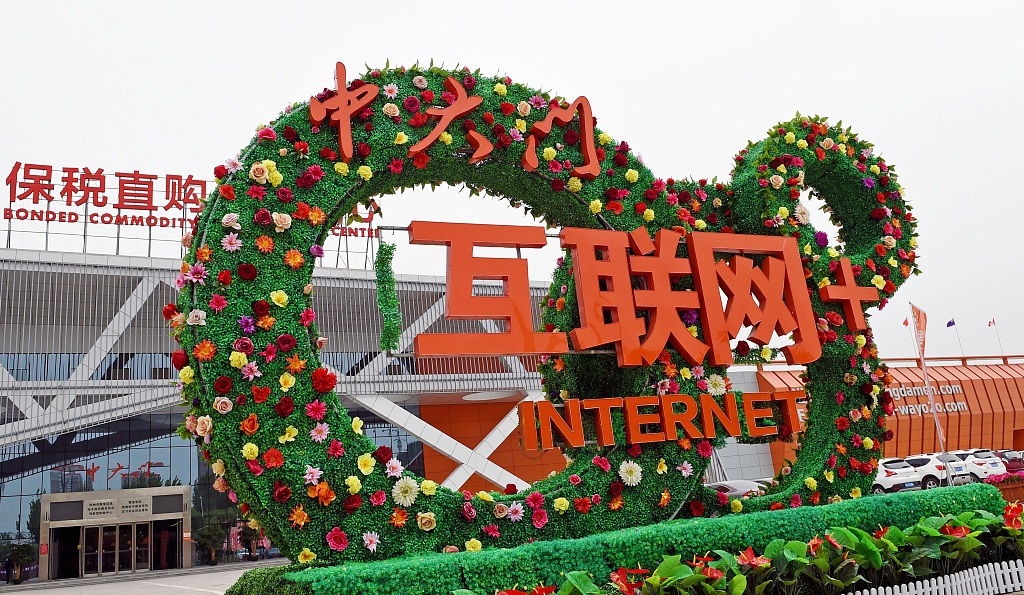 China's existing export/import framework was formed way before the arrival of bulk cross-border e-commerce transactions. Unfortunately, this structure was not able to manage the rapid growth of foreign trade. To address this problem, China came up with a solution to facilitate the burgeoning cross-border e-commerce scene aka experimental e-commerce ãspecial tradeã zones. Since 2015, the country has already set up cross-border e-commerce pilot zones in 13 cities that have led to tremendous growth in the cross-border e-commerce market. As many as 22 new locations across China, including Beijing, are to take part in this pilot program, in a bid to help boost foreign trade via digital platforms. These pilot zones will provide a more streamlined system with easy-to-follow regulations for prompt approval and examination, customs clearance and information sharing required for cross-border trade operations. To create a favourable atmosphere for this pilot program, Chinese e-commerce giant, Alibaba, has also been promoting special e-commerce trade zones in countries like Thailand and Malaysia. However, there have been some concerns on monopoly and impact on local firms.
China's existing export/import framework was formed way before the arrival of bulk cross-border e-commerce transactions. Unfortunately, this structure was not able to manage the rapid growth of foreign trade. To address this problem, China came up with a solution to facilitate the burgeoning cross-border e-commerce scene aka experimental e-commerce ãspecial tradeã zones. Since 2015, the country has already set up cross-border e-commerce pilot zones in 13 cities that have led to tremendous growth in the cross-border e-commerce market. As many as 22 new locations across China, including Beijing, are to take part in this pilot program, in a bid to help boost foreign trade via digital platforms. These pilot zones will provide a more streamlined system with easy-to-follow regulations for prompt approval and examination, customs clearance and information sharing required for cross-border trade operations. To create a favourable atmosphere for this pilot program, Chinese e-commerce giant, Alibaba, has also been promoting special e-commerce trade zones in countries like Thailand and Malaysia. However, there have been some concerns on monopoly and impact on local firms.
 Businesses in Macau and Hong Kong seem especially keen about the scheme with many coming on board to use the bonded warehouses for their fulfilment process.
Businesses in Macau and Hong Kong seem especially keen about the scheme with many coming on board to use the bonded warehouses for their fulfilment process.
ÍÍ£¤ÓçÍÙÍÍÀð¡ð¡ÒÇ¡Ìͤ
ð¡ÙͧӯÌÓҢͤÍÈÌÀÌÑÌ₤Í´ÍÊÏÍÛÒñ´ÍÂÓçÍÙÍÍÀð¤ÊÌͯÌËð¿ÍͧÂÌÓÐÒ¢ÓÏÓ£ÌÌ Ì°ÌÏÍÑÍÊÒÇ¡ÓÍ¢¨ÕÍÂÕ¢Ðð¡¤ð¤ÒÏÈÍ°Ò¢ð¡ˆÕÛÕÂÿ¥ð¡ÙͧÌͤð¤ð¡ð¡ˆÒÏÈÍ°Ì¿ÌÀÿ¥ð£Ëð¢Ò¢Ò˜ÍÍÍÝÓÒñ´ÍÂÓçÍÙÍÍÀͤÌ₤ - ÍÛÕˆÓçÍÙÍÍÀãÓ¿ÌÛÒÇ¡ÌãͤÐÒˆ2015Í¿Çð£ËÌËÿ¥Ò₤ËͧÍñýÍ´13ð¡ˆÍÍ¡ÒÛƒÓ¨ð¤Òñ´ÍÂÓçÍÙÍÍÀÒ₤Ոͤÿ¥Ò¢ð¤Ò₤ӿͤÍñýӣ͡ÎÍ´ð¤Òñ´ÍÂÓçÍÙÍÍÀͤ͡ÓÍñ´ÍÊÏÍÂÕ¢ÐÍ
̘Íð¤˜Í´Í
Óð¡ÙͧÍÊÒƒƒ22ð¡ˆÌ¯Í¯Ó¿Í¯Íð¡ÌÙÊÒ₤Ó¿ÕÀ¿ÓÛÿ¥ð£ËÍ¡ÛÍˋÕҢ̯ÍÙÍ¿°Í¯ð¢Ò¢Í₤¿ÍÊÒÇ¡ÌÐ
Importance of Digital Influencers in China
 In China, digital influencers play an important role in driving awareness of new products and shaping consumer preferences. When it comes to cross-border e-commerce and even domestic e-commerce, Chinese consumers heavily rely on the reviews and feedback given by these key opinion leaders to learn about the latest trends and products. Digital influencers churn out unique content ranging from social media live streams to articles on their official WeChat accounts. Influencersã feedback has a major impact on the e-commerce market growth. As per a recent Deloitte report, in the coming months live streaming in China will lead to $4.4 billion in direct revenue with influencersã live streams set to reach as many as 456 million viewers.
In China, digital influencers play an important role in driving awareness of new products and shaping consumer preferences. When it comes to cross-border e-commerce and even domestic e-commerce, Chinese consumers heavily rely on the reviews and feedback given by these key opinion leaders to learn about the latest trends and products. Digital influencers churn out unique content ranging from social media live streams to articles on their official WeChat accounts. Influencersã feedback has a major impact on the e-commerce market growth. As per a recent Deloitte report, in the coming months live streaming in China will lead to $4.4 billion in direct revenue with influencersã live streams set to reach as many as 456 million viewers.
 Ó§Ó£ÍÊÏVÍ´ð¡ÙͧÓÕÒÎÌÏ
Ó§Ó£ÍÊÏVÍ´ð¡ÙͧÓÕÒÎÌÏ
Í´ð¡Ùͧÿ¥Ó§Ó£ÌÒÏÕÂÒÂÍ´Ìը̯ð¤ÏÍÌÒ₤ÍÍÀÕ ÌÑÒÇ¿Ò
ÍÍ˧̿ÕÂÍÌËÓÕÒÎð§Ó´Ð Í´Òñ´ÍÂÓçÍÙÍÍÀð¿Ò°Í§Í
ÓçÍÙÍÍÀÌ¿ÕÂÿ¥ð¡ÙͧÌÑÒÇ¿Ò
ð¡ËÕðƒÒçÒ¢ð¤Í
°ÕÛÌÒÏÕÂÒÂÌðƒÓÒ₤ÒÛ¤ÍÍÕÎÿ¥ð£Ëð¤ÒÏÈÌ̯ÒÑÍ¢Íð¤ÏÍÐ Ó§Ó£ÍÊÏVÓÍÕÎÍ₤¿ÓçÍÙÍÍÀͤ͡ÓÍÂÕ¢ÌÕÍÊÏͧÝÍÐ
Welcome To The Age Of Online Meets Offline
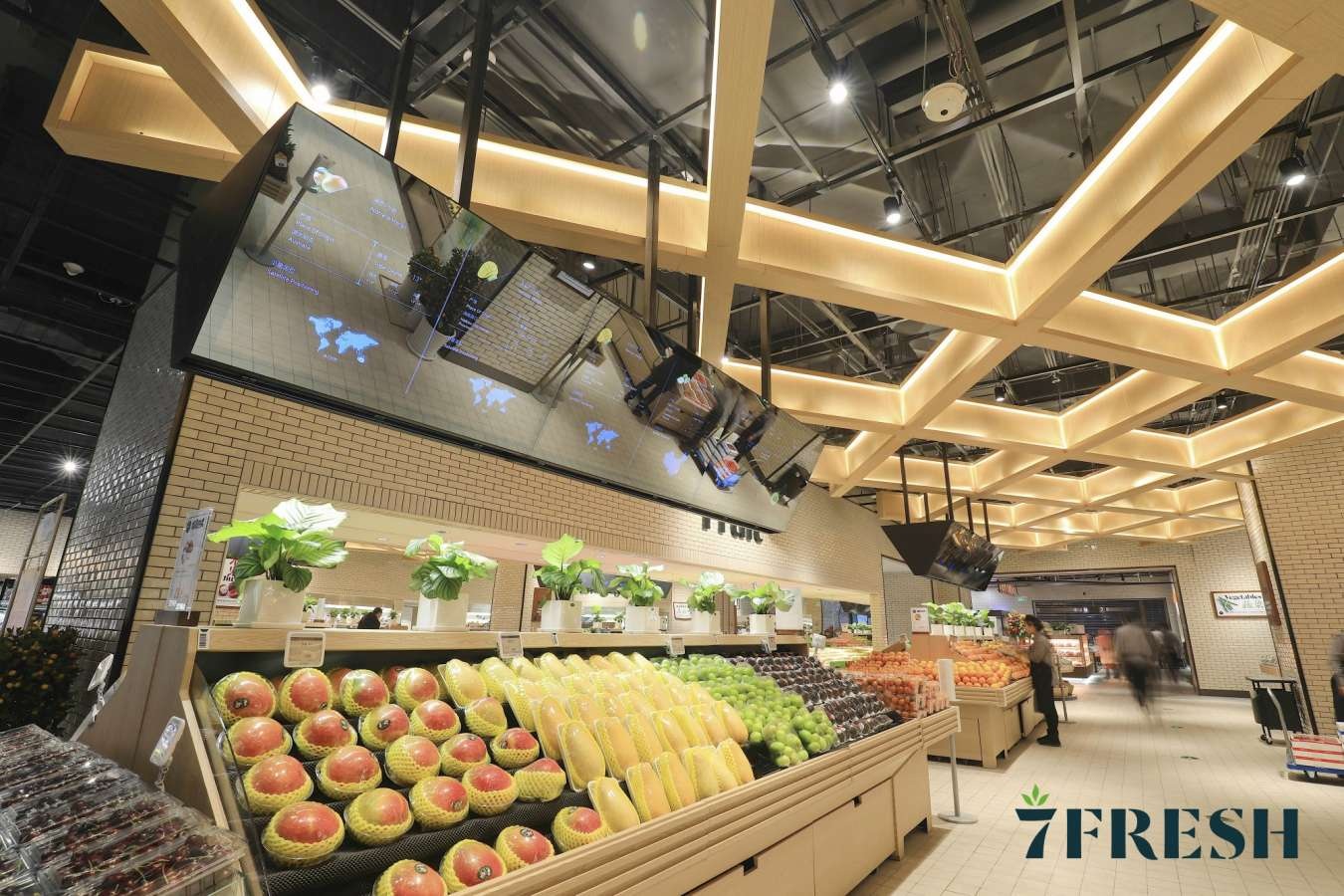 With the western world reacting to Amazon's recent integration of the cookie-cutter retail industry into the e-commerce space, China has already gained pace in revolutionising the retail-scape. This trend has hailed an era of New Retail - a faddish term coined by Alibaba's charismatic founder, Jack Ma, in 2016 that makes the distinction between virtual and physical commerce obsolete. The advent of this new generation of digitally connected retail has tech giants teamed up with retailers to bring cashless online and offline shopping experiences utilising latest technologies, data and customer engagement techniques.
With the western world reacting to Amazon's recent integration of the cookie-cutter retail industry into the e-commerce space, China has already gained pace in revolutionising the retail-scape. This trend has hailed an era of New Retail - a faddish term coined by Alibaba's charismatic founder, Jack Ma, in 2016 that makes the distinction between virtual and physical commerce obsolete. The advent of this new generation of digitally connected retail has tech giants teamed up with retailers to bring cashless online and offline shopping experiences utilising latest technologies, data and customer engagement techniques.
Taking the game to the next level are the e-commerce biggies, like JD and Alibaba, that have been rapidly setting up outlets across China, called 7Fresh and Hema respectively, where consumers are offered a wide range of digitally-connected experiential shopping. For instance, consumers can use their mobile phones to scan the barcode of any product in the store to learn about the item's source, price, nutritional information and other relevant information. Consumers are also provided with delivery at both the stores within 30 minutes or less time once they have made their purchases.
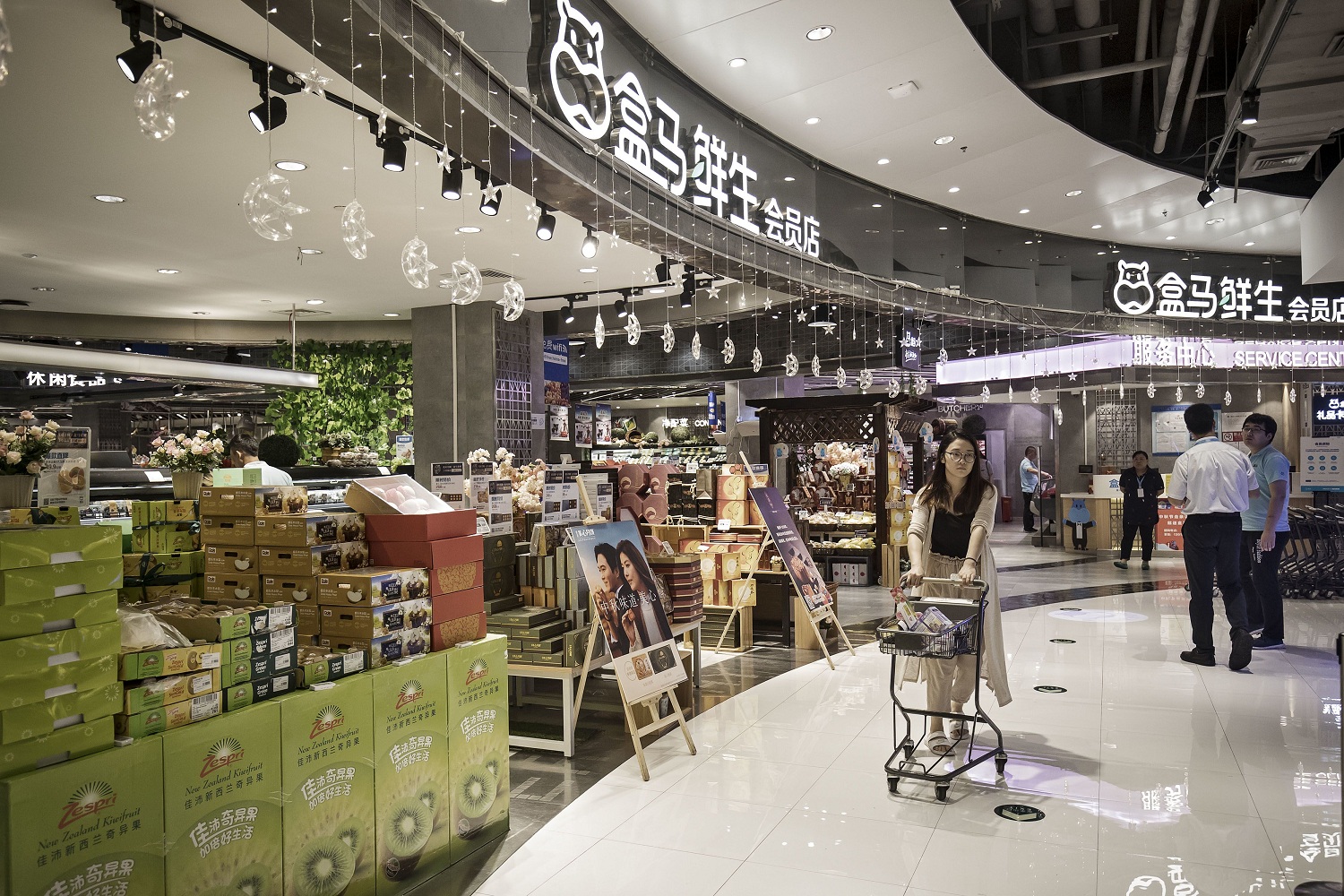 ̘ÂÒ¢ÌËͯӧð¡ÌÑð£È
̘ÂÒ¢ÌËͯӧð¡ÌÑð£È
ð¡ÙͧÍñýӣʹÕÑÍÛð¡ÓÕˋͧð¡ÙÍ̓ð¤Ò¢ÌÙËÐÒ¢ÓÏÒÑͥ͢Òçñð¤Ì¯ÕÑÍÛÌÑð£ÈÓÕÓ - Ò¢Ì₤ð¡ð¡ˆÕ¢ÕÍñÇÍñÇÍÍÏð¤¤Õˋ˜ð¤ÿ¥Jack Maÿ¥ð¤2016Í¿ÇÍÕ Óð¡ð¡ˆÌÑÕ¨ÎÓÌ₤Ò₤ÙÐ̯ð¡ð£È̯ÍÙÒ¢ÌËÕÑÍÛð¡ÓͤӯÒÛˋÓÏÌÍñ´ÍÊÇð¡ÕÑÍÛÍÍð§ÿ¥ÍˋÓ´Ì̯ÌÌ₤ÿ¥Ì¯ÌÛÍÍÛÂÌñð¤Í´ÌÌ₤Í¡ÎÌËÌ Ó¯ÕÓÍ´Ó¤¢ÍÓΣӤ¢ÒÇÙÓˋð§ÕˆÐ
ð¤˜ð¡ÍÕ¢ÕÍñÇÍñÇÒ¢Ì ñÓÓçÍÙÍÍÀÍñ´ÍÊÇÍñýÓ£Ò¢
ÕÍ´ð¡ÙͧÒÛƒÓ¨ð¤Íͤÿ¥ÍͨÍð¡¤7FreshÍÓÕˋ˜ÿ¥ð¡¤ÌÑÒÇ¿Ò
ÌðƒÍ¿¢Ì°Ó̯ÍÙÒ¢ÌËð§ÕˆÒÇÙÓˋÐðƒÍÎÿ¥ÌÑÒÇ¿Ò
Í₤ð£Ëð§¢Ó´ð£ð£˜ÓÓϣʹÓçÒ₤̨ÌÍͤð¡Ùð££ð§ð¤ÏÍÓÌÀͧÂÓ ÿ¥ð£Ëð¤ÒÏÈÍÍÓÌË̤ÿ¥ð£ñÌ ¥ÿ¥ÒËÍ
£ð¢ÀÌ₤ÍÍ
Ñð£Ó¡Í
°ð¢ÀÌ₤ÐÌÑÒÇ¿Ò
ð¡ÌÎÒÇÙð¿¯ÿ¥Í₤Í´30ÍÕÌÌÇÓÙÓÌÑÕÇÍ
Í´ð¡ÊÍÛÑÍͤҢÒÀð¤Êð£Ð
Stepping Up Rural Digitalisation
 A recent data says that the use of mobile phones in rural China far exceeds that of landline telephones and it has also been the most common way for people to connect to the internet. Rural consumers in China skipped the PC-era and used their mobile phones instead, not just to access the internet, but also buy products online. Chinese tech giants have identified this massive potential of the rural, inland regions of China and seek to revolutionise the future of e-commerce in the country. To reach out to this next wave of e-commerce customers, companies like JD have announced plans to build 185 drone airports in Southwest China for delivery purpose. Meanwhile, Alibaba is also in the process of scaling its "Rural Taobao" platform. The company has scored an investment worth $716 million in Huitongda that includes an 8-year-old rural-focused platform with eighty thousand member stores in eighteen provincial locations.
A recent data says that the use of mobile phones in rural China far exceeds that of landline telephones and it has also been the most common way for people to connect to the internet. Rural consumers in China skipped the PC-era and used their mobile phones instead, not just to access the internet, but also buy products online. Chinese tech giants have identified this massive potential of the rural, inland regions of China and seek to revolutionise the future of e-commerce in the country. To reach out to this next wave of e-commerce customers, companies like JD have announced plans to build 185 drone airports in Southwest China for delivery purpose. Meanwhile, Alibaba is also in the process of scaling its "Rural Taobao" platform. The company has scored an investment worth $716 million in Huitongda that includes an 8-year-old rural-focused platform with eighty thousand member stores in eighteen provincial locations.
 Í Í¥¤ÍÌð¢ÀÌ₤Í
Í Í¥¤ÍÌð¢ÀÌ₤Í
ÌÒ¢Óð¡ÕÀ¿Ì¯ÌÛ̃Óʤÿ¥ð¡ÙͧÍÌͯͤÓÓϣʹÓçÒ₤ð§¢Ó´ÕÒ¢Ò¢ÒÑ
ҢͤÍÛÓçÒ₤ÿ¥Ò¢ð¿Ì₤ð¤¤ð£˜Ò¢ÌËð¤ÒÓ§ÌÍ¡¡Ó´ÓÌ¿Í¥Ðð¡ÙͧÓÍÌÌÑÒÇ¿Ò
ð§¢Ó´Ì̤ð¡ð£
ð£
Ì₤ÒÛ¢ÕÛð¤ÒӧҢʹӤ¢ÒÇÙð¿¯ð¤ÏÍÐð¡ÙͧÓÏÌÍñ´ÍÊÇÍñýÓ£ÍÓ¯ð¤ð¡ÙͧÍÌÿ¥Í
ÕͯͤÓÍñ´ÍÊÏ̧Íÿ¥Í¿ÑÍ₤£ÌÝͧ£Í¤Ì¿Íð¡ÙͧÓçÍÙÍÍÀÓ̈ÌËÐ